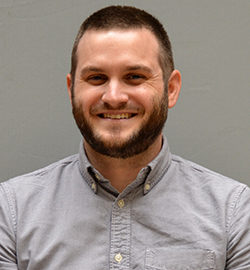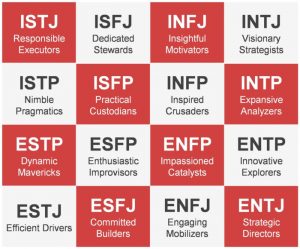Eureka professor takes deeper look at common personality tests
By Holly Eitenmiller For Chronicle Media — June 28, 2018
Dr. Alexander Swan, assistant professor of psychology at Eureka College, recently collaborated with California Polytechnic University, Pomona Marketing Professor Randy Stein on a research publication regarding the formats of two primary psychological assessment tests. (Photo courtesy of Eureka College)
Like fishing expeditions, personality assessment tests allow people to cast puzzling scraps of information into the deep, dark waters of the subconscious, in hopes of netting a sense of identity. Such tests, Dr. Alexander Swan said, can be quite misleading.
“When somebody wants to know their ‘true self’ there might features of personality assessments, vague, ambiguous questions that people can mistake as a revelation,” he said. “They think, ‘I must be searching my subconscious.’ You can’t search your subconscious, but the tests are designed to make people think they can.”
Swan, the assistant professor of psychology at Eureka College, recently collaborated with California Polytechnic University—Pomona Marketing Professor Randy Stein on the research publication, “Deeply Confusing: Conflating Difficulty With Deep Revelation on Personality Assessment.”
It’s a big title for what boils down to a study of how people connect the difficulty of a question with its depth.
“It comes down to the fact that, the seemingly sillier it is, such as ‘Compare these colors to a day of the week,’ the deeper people think it is,” Swan explained. “That it reveals more of their souls, their hidden selves.”
Swan and Stein selected two main personality indicator test formats for the study, the Myers-Briggs Type Indicator and The Big Five.
MBTI questions — which lead to results of four-letter acronyms like INFJ, ESTP, etc., — are heavily copyright protected, so the team selected questions from the Keirsey Temperament Sorter because of its likeness to the MBTI; 131 males and 156 females participated in the study.
Participants in The Big Five are given the opportunity to rate a question on a flexible scale of desirability; agree, disagree, neutral.
The Keirsey test, like the MBTI, only offers participants two options per question. An example of a Keirsey or MBTI question is, “Do you want things; a. Settled and decided or b. Unsettled and undecided.”
The first step was to establish a baseline comparison of the tests, and measure the difficulty and depth of each. Swan said participants overwhelmingly rated the Keirsey test as more difficult and deeper. In the following studies, they determined why.
Next, questions from each test were made more difficult. Then, in the final stage, Swan and Stein swapped the format of each test.
Participants were given only two answers for each Big Five question, while the multiple-choice format of the Big Five was used in the Keirsey questions.
Overwhelmingly, participants concluded that the two-option questions were more difficult, and therefore, deeper and more meaningful. The Keirsey and MBTI test formats seemed to be more difficult and meaningful to participants.
“The Keirsey and MBTI, what they do is, they’ll ask the person who’s taking it an incomplete sentence. To identify your personality type is to pick one of two that completes the sentence. It’s a dichotomous choice,” Swan said. “A lot of the time the A/B choices are not logical or psychological opposites, sometimes they’re in the same vein. That’s one of the inherent difficulties.
“Big Five are straightforward, trait identifying statements. ‘I like to be around people.’ You rate that on a scale on 1 – 5, agree to disagree. The statements are clear straightforward and short,” he said.

The 16 personality types as outlined by the famous Meyers-Briggs test. Many people take psychological assessment tests, such as the to see what sets them apart from other people. “People are looking to find out who they are, their true selves and the meaning of their lives,” Dr. Alexander Swan, assistant professor of psychology at Eureka College.
Despite the issues with personality assessments, the MBTI and Keirsey tests continue to be regarded with high esteem. Employers often depend on these tests when vetting applicants and there are many Internet communities based on them, Swan said.
“There are communities all over the web that swear by the results of the Myers-Briggs — online publications, logs, devoting to spreading and proliferating the word as if it were,” he said. “Facebook has made it easier to group people in a form of tribalism with group biases and whole lot of other negative, antisocial orientations.”
Like the use of psychic mediums and astrology, people seek deep insight into themselves through personality assessments, thus relegating, and limiting their lives to a set of ideals and qualities that may not be realistic.
Some practitioners of the MBTI test go so far as to compare each of the 16 personality types it prescribes to famous people who have never taken the test. Simply type Famous INFJs, (Introverted, iNtuitive, Feeling, Judging), an MBTI type, and the names Jesus of Nazareth, Plato and Mahatma Gandhi will appear.
People find these comparisons flattering, he said, and it’s likely most people wouldn’t take a test that might reveal if they are racist, homophobic or narcissistic.
“The results supposedly represent you, and you get put into a nice little positive sounding box … it’s still very positive. The temperament sorters, they don’t say you’re lazy. mean or cruel,” Swan said. “ ’You’re an INFJ, and here are the qualities,’ and people think, ‘Oh, that’s totally me!’
“Then people will rationalize and justify things based on their personalities. They’ll end up in a self-fulfilling prophesy. They’ll end up in what Myers-Briggs said they would, which, according to them, there’s only 16 types of people in the world.”
In this manner, people believe they can become deeply self-aware and identify with others who are compatible, and that, he said, makes life compatible.
It does not, however, take into considering the evolution of the psyche, and the ongoing changes that occur throughout a person’s life.
Post-traumatic stress disorder is one example of an individual or set of circumstance that creates powerful, sometimes permanent changes in the human psyche.
“Evolutionary psychologists believe our brains have not caught up technologically or socially,” Swan said of the masses who attempt to dive into the deeper waters of the mind.
For a copy of Swan and Stein’s study, email aswan@eureka.edu.



